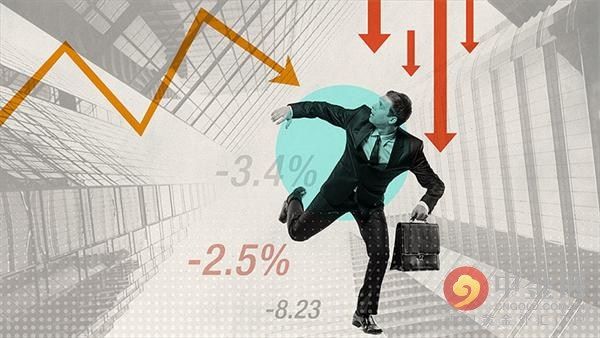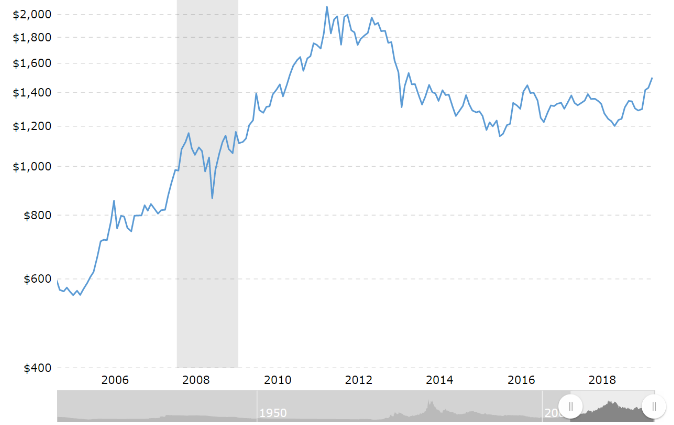Repeated mistakes | Can cryptocurrency prevent the next recession?
This year is 2008. Subprime mortgages have just begun to have a ripple effect, which will trigger shock waves in the global economy, causing the worst recession in history.

chain reaction
Prior to the financial crisis, the total debt liabilities of the US credit system was approximately $ 53 trillion. Banks had liquidity of about $ 350 billion at the time. The debt to cash ratio is 150: 1. Such high system-wide leverage means that the world is not ready for the extreme procyclicality that comes with it.
- FCoin releases latest announcement: funding gap of approximately 90 million USDT
- Vitalik Buterin: Ethereum 2.0 Phase 0 is expected to start this summer, and PoS will eventually become a reality
- Airdrop BTC! Billionaire Tim Draper asks you to learn blockchain
First, Lehmann Brothers, which specializes in subordinated debt securitization, declared bankruptcy. Then it appears that HBOS, Britain's largest mortgage seller, will be the first British victim of the crisis. American International Group (AIG), the world's largest insurance company, has just taken a rather unscientific move to guarantee a safe balance of leveraged debt. As the crisis escalated, FTSE100 lost 90 billion pounds of value in one day.
The UK announced a £ 50 billion bank emergency assistance program, while the Troublesome Asset Assistance Program purchased $ 700 billion of endangered assets from Wall Street. The IMF announced another $ 200 billion in loans to governments around the world.
As defaults occur, worries about further bankruptcy of the entire economy lead to shrinking cash reserves and short-term markets, leading to reduced liquidity. Consumers and businesses are tightening their wallets and paying more attention to keeping cash deposits to ensure they can meet their obligations. Slowing down-cash in circulation is not enough to continue paying down debt and more defaults have occurred. An uncontrollable deleveraging spiral appeared and the market plummeted.
2008 and 2019
The current stock market bull market is the longest in history. Those familiar with the market will realize that all markets have cycles, and the average market cycle lasts five and a half years, and we should have fallen into recession long ago.
In 2008, before the plunge, dark clouds spread. Since 2006, the price of gold and other "hedged assets" have skyrocketed, the bond market yield curve has reversed two years ago, and house prices have started to fall.

Gold prices were before 2008 and now. The shaded area is the birthplace of the economic recession.
In 2019, as investors seek safe assets, the price of gold (and bitcoin) has risen, historically seen as inversely proportional to the US dollar. Household debt in the United States is above its 2008 peak. The yield curve has just reversed, before each recession in the past 50 years.
This does not necessarily mean that an economic recession is imminent, but as the market fluctuates naturally, it is largely inevitable.
Blockchain and the “ token economy ''
Is it possible to ease the coming recession? Maybe.
I believe that the potential benefits and efficiencies of DLT can be huge, thereby creating and allowing access to new or illiquid markets, simplifying financial productivity, and making the concept of wealth more global.
Tokens are programmable proof of investment, ownership or equity. Creating them is simple, and data is protected by classification through Merkle Trees. In a Turing-complete environment, the possibilities are endless.
Efficiency and cost savings
Blockchain will optimize the global financial infrastructure and enable institutions to collude with each other in terms of data transmission and sharing. Rather than walking back and forth between institutions, it is better to agree on models and coordinate data in the transaction itself.
We will agree to industry standards and create a system based on a single protocol and with trust at the core, rather than isolated, isolated legacy systems. When it can be built into the infrastructure itself, proprietary legacy integration or protocol layers are no longer needed.
Currently, the standard settlement and payment time is up to T + 2. DLT can reduce it to the sub-second level, which greatly reduces counterparty risk and eliminates the need for expensive risk assessment software.
Financial market boundaries will no longer exist, and assets may bring productivity to the 24/7 economy.
The cost of the management process can be shared between the parties, and the parties will eventually eliminate the practice of reconciliation entirely because they rely on the ledger as a single source of fact.
Collective partial ownership
The collective partial ownership of tokenized assets will provide financial inclusion to the poorer population and society, thereby reducing the world's "rich-poor gap".
Consider housing. Excessive demand for deposits and rising market prices mean that a large number of younger generations cannot invest in real estate at all and wage growth cannot keep up.
Now consider whether an attribute has been marked as 100 transferable tokens. The owner of the property benefits from a highly liquid market to raise equity. The investment market benefits from a lower entry threshold (you may invest £ 300,000 in a property for as little as £ 3,000).
This not only allows more investors to participate, but also enables extremely diversified investment portfolios (modern portfolio theory), so it is possible to develop more secure investment strategies.
Perhaps the owner of the token can also earn interest on the rent of the property, which is proportional to its ownership. Maybe they can reinvest these returns autonomously and effortlessly-compound investments become effortless.
Is there no excess of $ 110 million? Don't be disappointed-tokenized.
Tokenization can create a more balanced investment portfolio and has the chain effect of stabilizing the macro economy.
Macro market efficiency
Data privacy technology will usher in a new era of "big data" and improve the efficiency of the macro market.
Typically, retail investment data is proprietary and cannot be shared due to GDPR and other such directives. If this data can be anonymized and sold to a wider market-or computing can be used without actually exposing the data (Secure Enclaves, zero-knowledge proofs, etc.) , then the market may see a net increase in productivity.
As regulators can stop and analyze real-time transactions in a DLT environment, supervision becomes easier.
Economic sanctions on countries and malicious institutions have become easier to enforce.
Violations of guidelines and directives are considered harmful to the economy (subprime loans, anyone?), And once they occur, they can be assessed and prevented, limiting damage and blaming blame with unprecedented clarity.
in conclusion
I hope that tokenization will usher in a new era of financial prosperity similar to the industrial revolution, but it takes time and energy to succeed.
From solving the inequities in the existing system while ensuring that the economy is at the highest level of productivity, to encouraging collusion between competing entities to achieve the net benefit of all people, tokenization has incredible hopes.
Standards must be developed. Interoperability will be key. Consortia will become the norm. Token is the killer application of blockchain.
Article source: https://medium.com/swlh/can-the-token-economy-prevent-the-next-global-recession-de3737b84731
We will continue to update Blocking; if you have any questions or suggestions, please contact us!
Was this article helpful?
93 out of 132 found this helpful
Related articles
- Opinion | Analyst Willy Woo: Bitcoin will reach $ 135,000 in a bull market, but the worst is also planned
- Observation | How did Ripple's performance with the payment giant MoneyGram 8 months after its alliance?
- SheKnows | Thunderstorm, Attack, Vulnerability! What will protect you, my BTC?
- Big households have begun to enter a new accumulation stage. Is the ETH rising signal coming?
- Messari: When the stock market falls, it also falls. Which risk does Bitcoin avoid?
- QKL123 market analysis | Crypto asset license issuance, trading platform South Korea Zhao'an (0306)
- CBDC: A central bank for everyone? | National Bureau of Economic Research Working Paper





